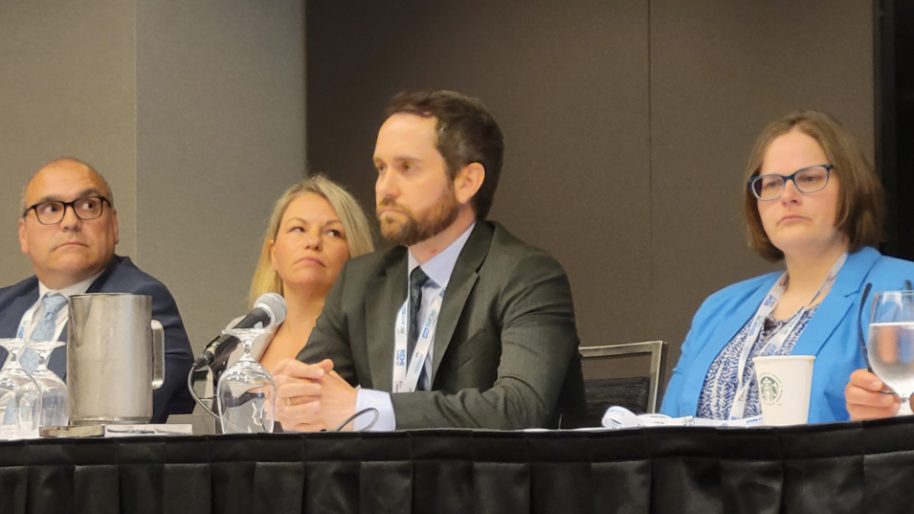In what you might call the early post-pandemic days, the janitorial industry finds itself in a tough position when it comes to its workers. While the public recognition of the importance of the roles played by cleaning and sanitation staff has undoubtedly increased since the start of 2020, the problem has quickly become getting these staff on board.
At the 2022 ISSA Show Canada in Toronto in June, a panel of building service contractor (BSC) and property management (PM) executives discussed the issue of attracting workers as part of a wider discussion on where the industry goes from here.

Chris King
RELATED: Where do BSCs and PMs go from here?
We also dived a little deeper into the BSC side of things with one of those panelists, Hallmark Housekeeping Services Senior VP Chris King. With King, we discussed how the industry’s evolving technology can help ease the burden on over-stretched workers amid a labour crunch, as well as key ways that BSCs can look to ensure they are attracting and retaining the talent they need to thrive.
This interview has been edited for length and clarity.
Fundamentally, how is evolving technology changing the industry and providing an increased ROI?
King: Technological advancement within our industry is increasing at a rate we’ve never seen before and is allowing us to make significant gains in productivity and even to change the way we clean. Instead of it being there to improve the performance of a specific task, it’s changing the very type of cleaning model we use, mainly from a relatively fixed model to one that’s a lot more dynamic. Technology is supporting post-pandemic cleaning and allowing cleaning companies to go where the occupancy is and where service is needed most. That’s a big change for the positive.
How can these evolutions help rather than hinder overburdened workers?
King: The labour pool has shrunk, so we’re now forced to figure out how we can do more with fewer people to continue to service our customers in buildings to the highest levels of performance. It’s become increasingly important for companies to leverage automation and technology to accomplish more with less staff. Having said that, we certainly don’t want technology to discourage people from joining our industry; suggesting we as an industry are looking for ways to cut labour couldn’t be further from the truth. We will always need people and human labour. The problem is that we don’t have enough staff, so we need to find ways to reduce the burden on them and allow them to dedicate their time to specialized tasks where that is needed most. Technology can be the answer; that it also allows property managers to save on labour costs is a bonus.
Let’s use smart sensor tech as an example: how can this alleviate the labour burden?
King: Smart sensor technology and artificial intelligence, a huge booming sector in our industry and beyond, allows us to be more efficient with our labour by optimizing daily schedules and workloads. It gives us information about building usage: we know where people are and what they’re doing, and that allows us to deploy staff in the most efficient way. Say an office building has two sets of washrooms per floor. In some cases, particularly with the post-pandemic shift in office occupancy volume, no one has been in one floor’s washrooms. So, the trip up the elevator to the floor with all their equipment and supplies is a waste for staff. Now, whereas washroom cleaning staff would previously have had to go to every floor and check every washroom, we’re able to see how many people have gone to the washroom and we can get an alert if a certain threshold is crossed. Then, staff can be sent to that particular washroom because it needs to be serviced. Again, it’s all about accomplishing more with less.
Tech can help ease the strain on workers. But getting workers through the door is still a problem for BSCs. What can we do to help resolve that?
King: Attracting workers is highly difficult right now. It’s incumbent on BSCs to give people a reason to want to not just join but stay in the janitorial industry. We need to continue finding ways to make this industry attractive. There are different areas for us to focus on – technology, yes, but also training, communication, culture. It’s a combination of them all. Improving culture, strengthening wellbeing programs, providing extensive and immersive training programs and clear pathways to internal progression at our companies. When’s someone’s learning new skills, let them know how those skills can allow them to further themselves in the janitorial industry, all the way up to management. All those things are extremely important.
Ultimately, it has been suggested that employee attraction all starts with wages. Is that a fair summary?
King: Future opportunities, company culture, and all those other things are important to employees, but before all of that, yes, we need to pay people properly. If people can’t make enough money and sustain themselves in this industry, they won’t join. That must come first. As an industry, we need to work together to bring wages up. The future of janitorial really does depend on it. BSCs must work with PM partners to ensure we’re on the same page: that wages will go up even though costs will inevitably go up at the same time. We will try to find ways to offset some of those costs with efficiencies, but we need everyone to work together to raise the integrity of this industry and get the wages, benefits, pensions up so that people will want to join. This is not just on BSCs or just on PMs; we all have to be a part of providing a proper future.








